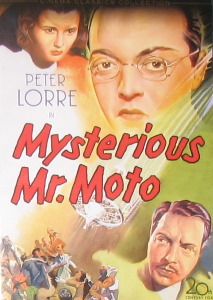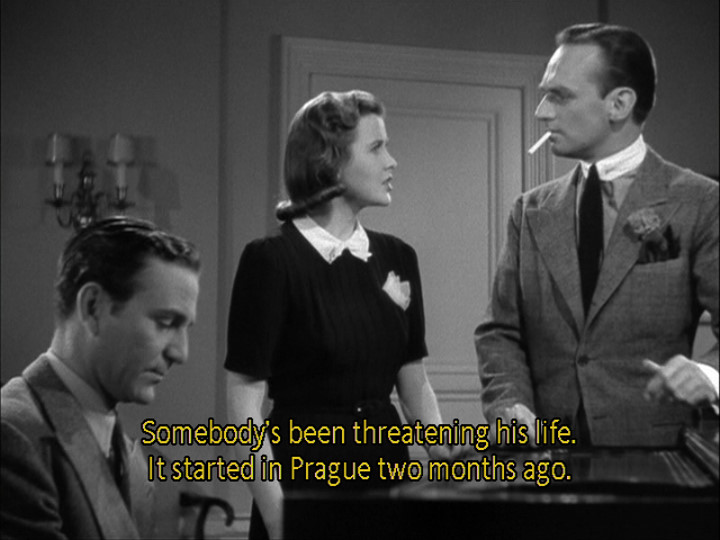![]()
![]()

![]()
![]()
|
|
Mr. Moto Collection, Vol. 1
Think Fast, Mr. Moto Thank You, Mr. Moto
Mr. Moto Takes a Chance Mysterious Mr. Moto
In the realm of filmdom, Mr. Moto is no ordinary detective. He is short,
relatively unattractive, and has a personal interest in the business of
importing rare goods. His drink of choice is far removed from James Bond’s
preference for martinis--Moto frequently chooses to imbibe a tall glass of milk.
Still, behind the quiet demeanor and gentlemanly manners lies a quick-thinking
spy with ninja-like agility and a flair for hand-to-hand combat. Even the guilt
of murder has very little weight in his mind. Moto is a master of disguise and
can cleverly manipulate even the most intelligent persons.
Writer J.P. Marquand, a columnist at The Saturday Evening Post, is responsible
for creating Mr. Moto. Marquand, who was under orders to write mystery stories
with an Asian hero, rather forcibly conceived the character. In light of the
recent death of Charlie Chan author, Earl Biggers, Marquand was sent to Asia to
gather background to form a series of stories. While in Asia, he encountered a
short Japanese detective who would later become the inspiration for Moto.
Marquand translated his original idea into several novels and their popularity
quickly inspired the film adaptations. It’s widely considered that the books are
superior to the films, but when the films first went into production, they were
hardly one of Fox studio’s priorities and were assigned to a B-movie producer,
Sol Wurtzel, to handle. The films may have much higher production values than
the B-movie label suggests, but the series never fails to follow the formulaic
structure that Wurtzel utilized regularly. Although Wurtzel is easily one of the
lesser-known film moguls--largely because he stood in the shadows of William Fox
and Fox’s predecessor, Darryl F. Zanuck--his B-movie unit consistently made a
profit for Twentieth Century Fox, and the Moto films were amongst his finest
achievements.
Wurtzel wisely recruited Norman Foster to direct the first film in the series, “Think
Fast, Mr. Moto” (1937). Foster, an actor turned aspiring director, knew he
had to pay his dues on lesser films before he could take on the responsibility
of more substantial projects. In an effort to impress his superiors, Foster
eagerly offered to share writing duties, which can be a particularly beneficial
experience for an unproven director. Foster naively accepted the offer to direct
the film without considering the possibility that the first film’s success might
encourage the eventual formation of a series. Had he known that eight films
would be eventually produced (five of which would have him in the director’s
chair), Foster might have been less likely to sign up for such a project.
Of all the decisions Wurtzel made, assigning Peter Lorre to the role of Mr. Moto
was likely his most informed. Originally, Foster wanted to abandon typical
Hollywood procedures and hire a Japanese actor for the role of Moto, but once he
was offered the chance to work with Lorre, he immediately accepted. Wurtzel and
his superiors were also satisfied with the decision; Lorre had been signed to a
contract but was underutilized because casting directors were rarely aware of
Lorre’s range and versatility. In the years leading up to his first Moto film,
Lorre was searching for a change of pace, which was his original reasoning for
signing with Twentieth Century Fox.
Lorre’ mesmerizing performance in Fritz Lang’s masterful “M”
(1931) was one of the many reasons for the film’s tremendous critical success.
Unfortunately, instead of amassing a legion of fans, the public hated Lorre
solely because of the character he portrayed onscreen. In a situation where an
actor suddenly withdraws from his profession, one would usually question the
actor’s talent. However, in Lorre’s case, his performance was so in tune with
his character that the public had difficulty distinguishing between the two.
Lorre didn’t just provide an impressive performance; it was his physical
appearance that allowed him to fully realize his role. Lorre had an innocent and
younger looking facial structure in his 20s, but simultaneously, he could appear
dark and suspicious. These qualities were particularly important in playing a
child murderer, and they’re specifically what attracted Lang to Lorre. Since
Lorre and his character, Hans Beckert, had merged as one in the public’s eye, he
was ridiculed in the streets and occasionally assaulted for the actions of his
character. Lorre would tough it out for a few more years, but eventually Alfred
Hitchcock gave him his ticket out of Europe by casting him as the villain in “The
Man Who Knew Too Much” (1934). Still, it was evident that Lorre was
dangerously typecast, and he became adamant in attempting to re-define his
acting ability. The last thing Lorre needed was his name to become synonymous
with another new character, but that’s precisely what happened over the course
of eight Mr. Moto films.
In one of my favorite moments in the series, the character of Marty (Robert
Kent) in “Mr. Moto Takes a Chance” remarks [after seeing Mr. Moto], “If I
were making a horror movie, I’d cast him as the murderer.” I’m possibly reading
into the expression far more than one should, but the dual meaning of the
dialogue provokes a resounding feeling of finality in reference to Lorre’s
career. Obviously, Joe is referring to the suspicious nature of Mr. Moto, but I
have a hunch that the screenwriters were also commenting on Lorre’s inability to
escape typecast roles and particularly referring to his part in “M.” It’s quite
ironic that the character Lorre notoriously resented had perhaps the most
similarities to his own life. From what I’ve heard, Lorre was an intelligent and
mannerly person and clearly, his profession exhibited violent and corrupt
alter-egos--the two sides to Moto.
Although neither director nor star were particularly fond of the Moto films,
it’s rather difficult to deny that the series was quite popular during the time
of the original releases. Once the series was terminated, important
opportunities lay ahead for both Foster and Lorre, but whether the Moto films
were responsible is debatable. Lorre dreaded the association he had with the
character but went on to provide Hollywood with some of the most legendary
supporting performances. Amongst his finest are those of Joel Cairo in the
landmark noir, “The Maltese Falcon,” and Ugarte in Michael Curtiz’s
classic “Casablanca”
(1941). Foster eventually had the good fortune of directing more illustrious
projects including three additions to the Charlie Chan series--Moto’s
better-known counterpart. Perhaps the two talented men hardly recognized it at
the time, but they’re largely responsible for the establishing the benchmark for
the present spy/detective genre (i.e. James Bond and Indiana Jones)--a
reasonably impressive achievement.
Kurtis J. Beard
Titles
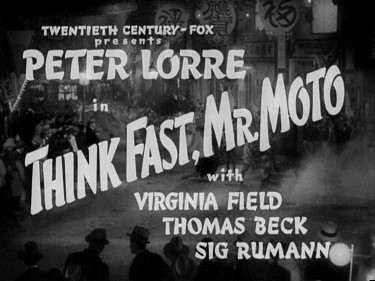 |
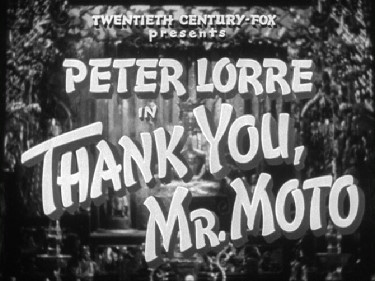 |
.jpg) |
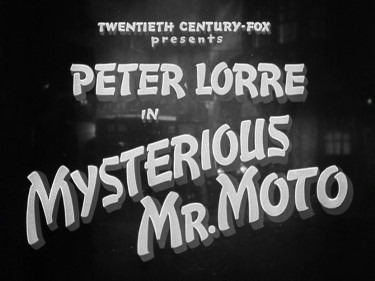 |
|
Synopses:
Think Fast, Mr. Moto |
Posters
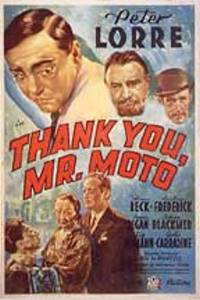 |
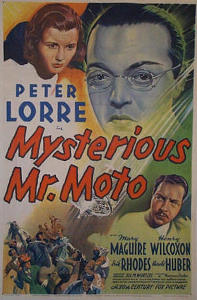 |
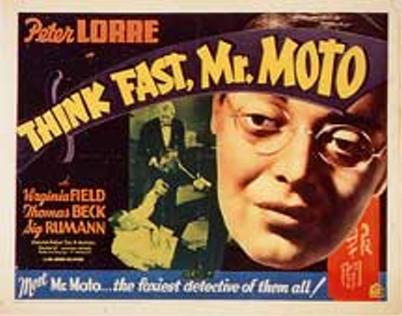 |
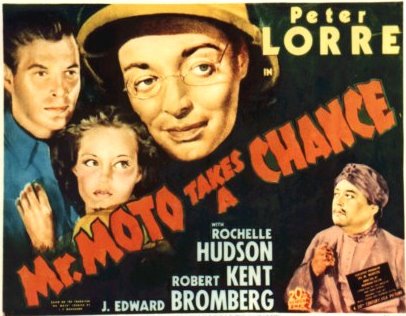 |
Theatrical Releases: July 1937 - October 1938
DVD Review: 20th Century Fox (4-disc) - Region 1 - NTSC
| DVD Box Cover |
|
CLICK to order from: |
| Distribution | 20th Century Fox - Region 1 - NTSC | |
| Time: | Films are between 60-70 minutes each. Extras add more. | |
| Audio | English (original mono) English (2.0 stereo) | |
| Subtitles | English, Spanish, None | |
| Features |
Release Information: Edition Details:
• Think Fast, Mr. Moto
|
|
| Comments: |
NOTE: Although the 4 main features of this boxset are housed in individual vintage art keep cases (see images below) they are not sold separately at this time and can only be obtained in the Fox Mr. Moto Collection, Volume 1. This sure was a unique time in Hollywood - a successfully transformed Hungarian actor adequately portraying a Japanese detective. This DVD collection represents the first, second, fourth and fifth entries of the eight Mr. Moto film series. We can assume that Volume 2 will contain the omissions. Fox spent over $2 million restoring all of their Charlie Chan and Mr. Moto films. These prints were not in as bad a shape as the Chan ones and look quite good. Mr. Moto Takes a Chance is the best looking of the lot but none are excessively poor and overall they share some decent consistency. There is visible digital noise/faux grain, minimal dirt, but neither are excessive - especially considering these films are bordering on being 70 years old. The sound is obviously not state of the art but dialogue is clear and quite audible. An option for original mono or 2.0 channel stereo is offered. The stereo did sound marginally superior to my ear. I'm not a fan or the color yellow for the optional subtitles which are offered for both English and Spanish. Supplements are adequate with a
featurette offered for each individual film. I was keen on the Harvey
Parry and Sol Wertzel information. There are also restoration
demonstrations (split screen) and trailers.
|
DVD Menus
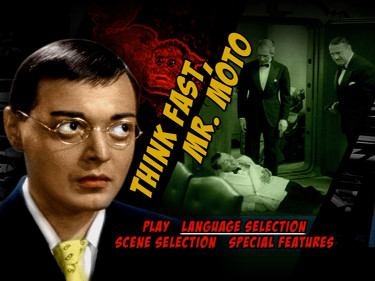 |
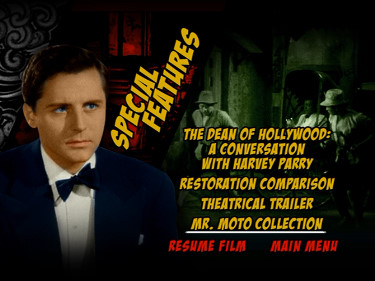 |
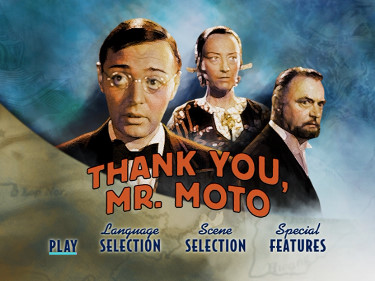 |
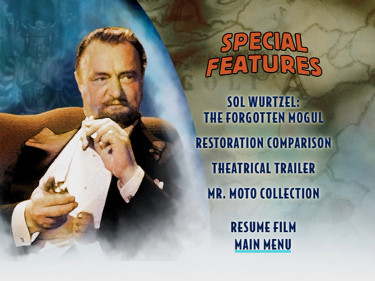 |
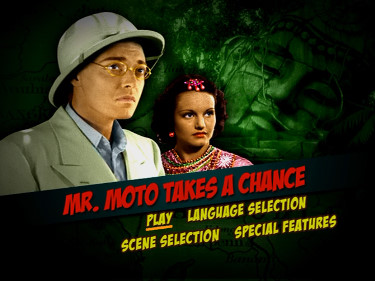 |
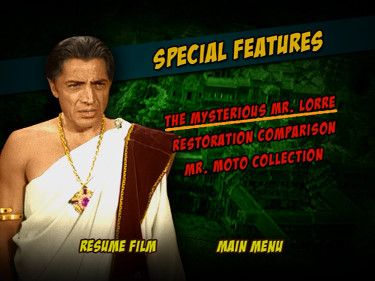 |
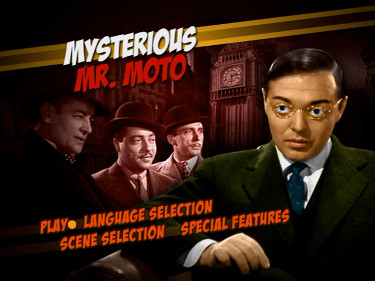 |
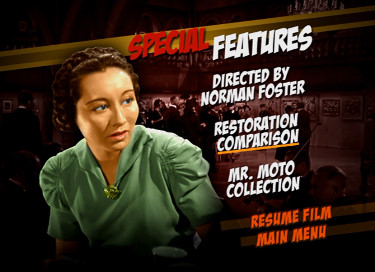 |
Special Features
:
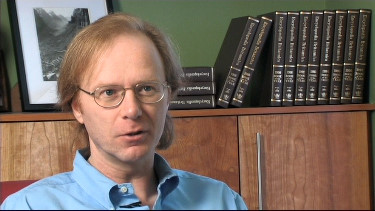 |
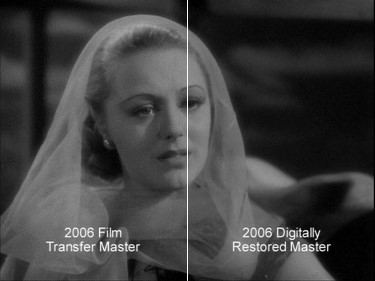 |
|
|
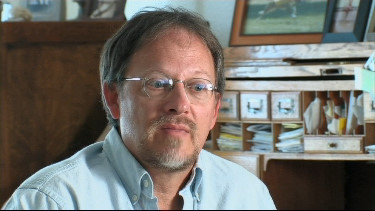 |
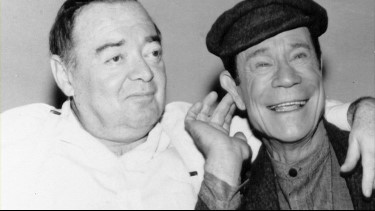 |
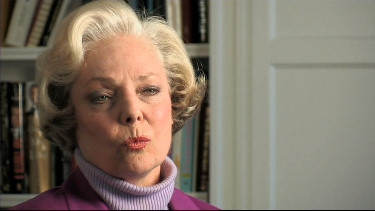 |
Keep Case Cover
|
|
Screen Captures
Think Fast, Mr. Moto USA 1937
Starring Peter Lorre, Lee Phelps, Virginia Field and Thomas Beck
|
|
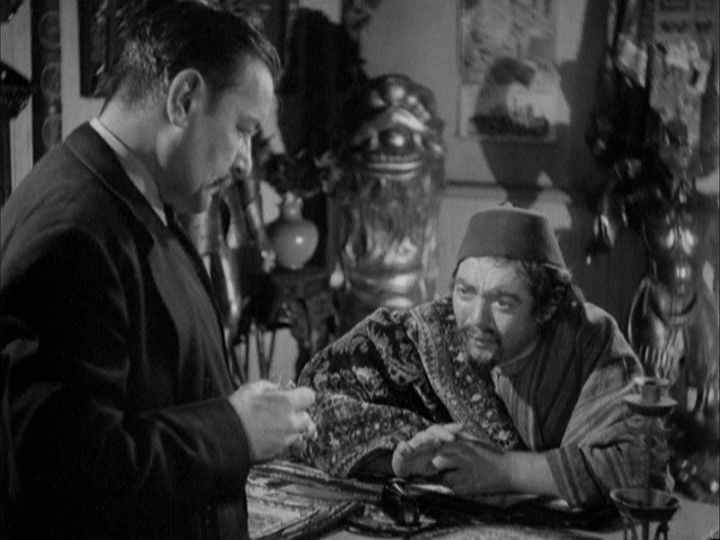 |
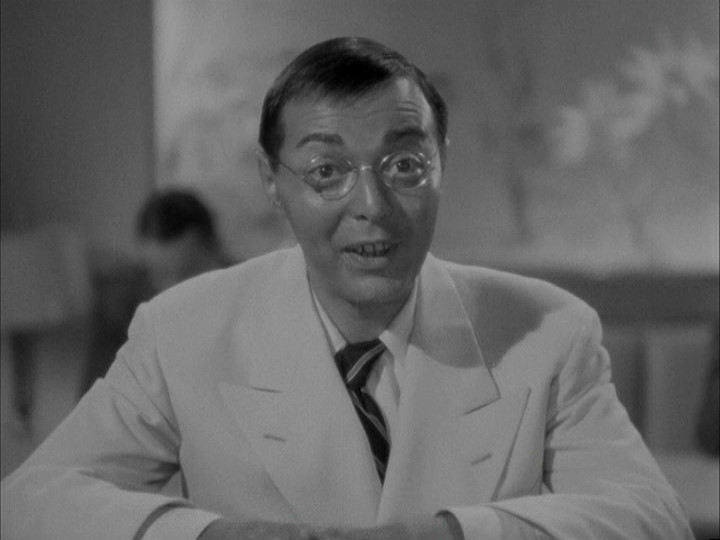 |
Keep Case Cover
|
|
Screen Captures
Thank You. Mr. Moto USA 1937
Starring Peter Lorre, Thomas Beck, Pauline Frederick and Jayne Regan
|
|
|
|
|
|
Keep Case Cover
|
|
Screen Captures
Mr. Moto Takes a Chance USA 1938
Starring Peter Lorre, Rochelle Hudson, Robert Kent, J. Edward Bromberg and Chick
Chandler
|
|
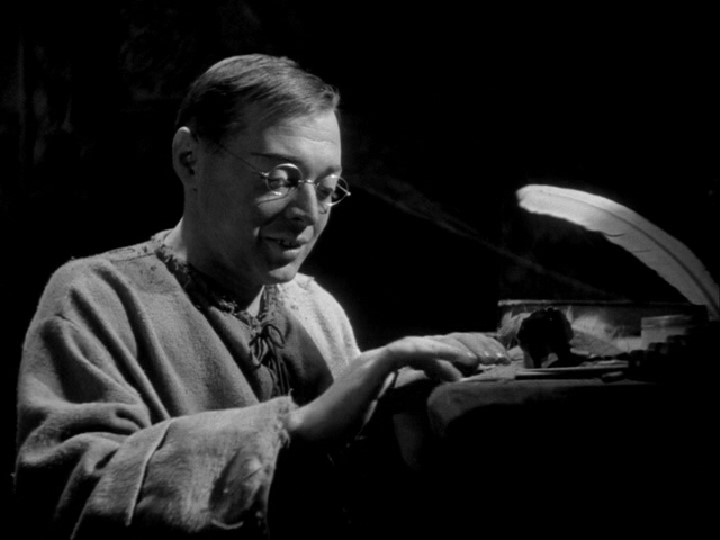 |
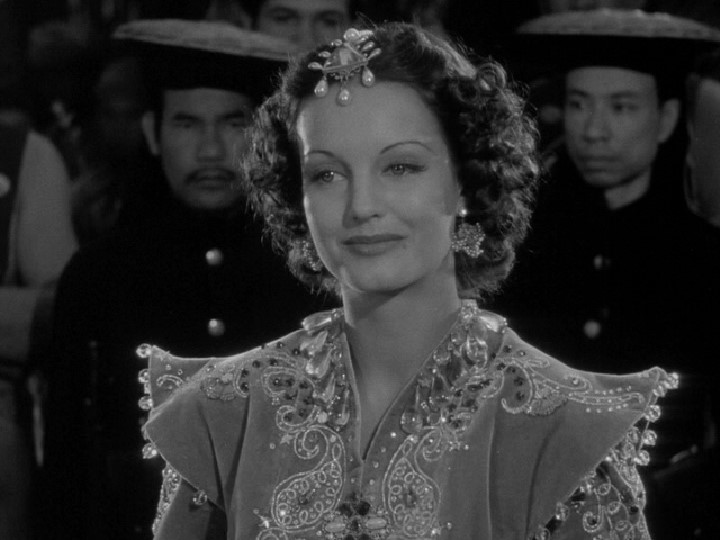 |
Keep Case Cover
|
|
Screen Captures
Mysterious Mr. Moto USA 1938
Starring Peter Lorre, Mary Maguire, Henry Wilcoxon, Erik Rhodes, Harold Huber
and Leon Ames
|
|
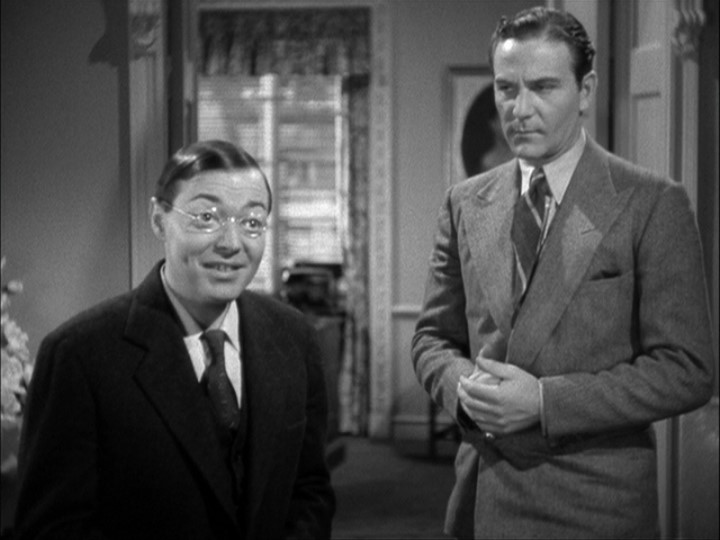 |
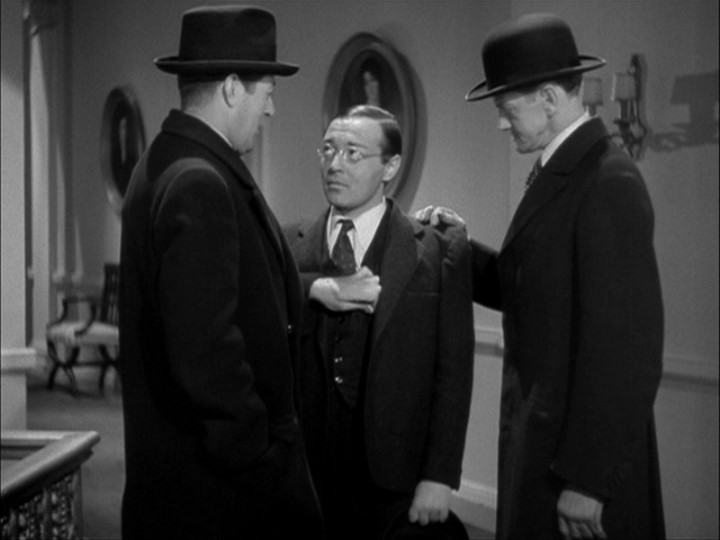 |
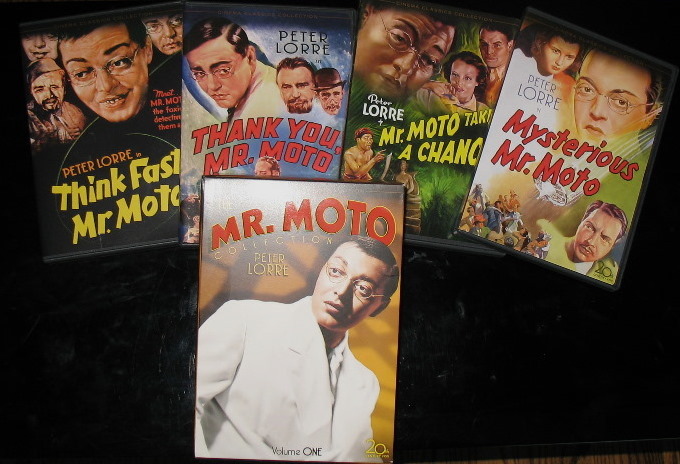
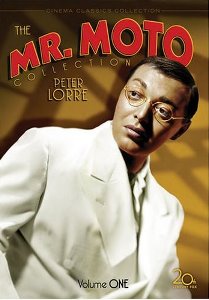
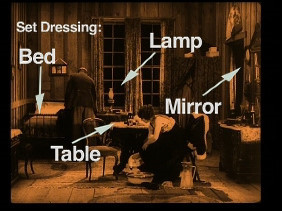
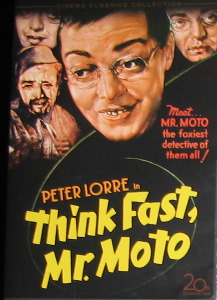
.jpg)
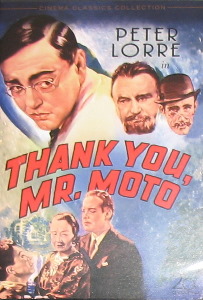
.jpg)
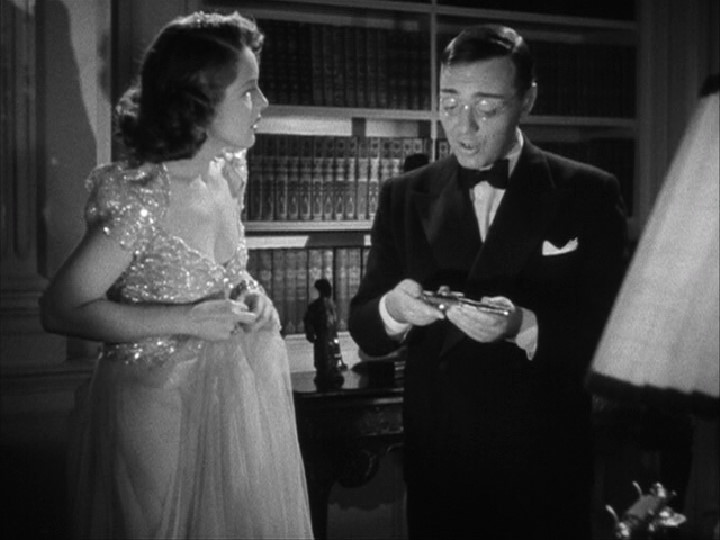
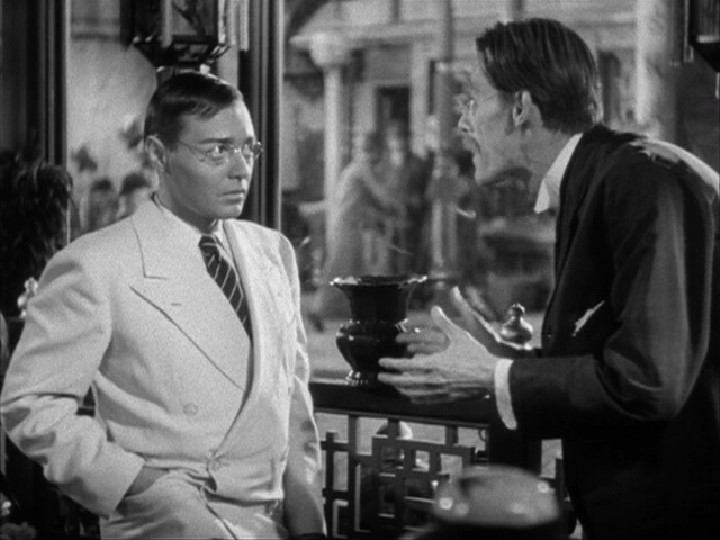
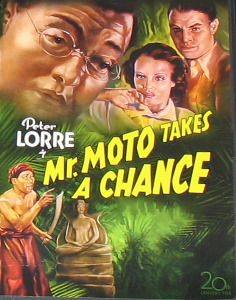
.jpg)
